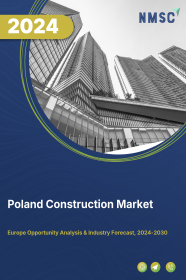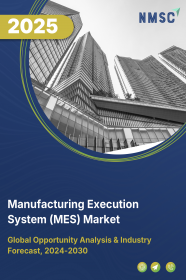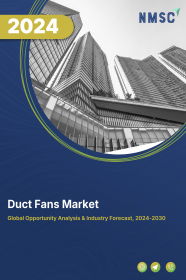
Poland Construction Market by Type (Renovation and New Construction), and by Sector (Real Estate, Infrastructure, and Industrial)–Opportunity Analysis and Industry Forecast, 2024–2030
Industry: Construction & Manufacturing | Publish Date: 05-Nov-2024 | No of Pages: 111 | No. of Tables: 78 | No. of Figures: 43 | Format: PDF | Report Code : CM2213
US Tariff Impact on Poland Construction Market
Trump Tariffs Are Reshaping Global Business
Poland Construction Market Overview
The Poland Construction Market size was valued at USD 100.75 billion in 2023, and is predicted to reach USD 130.88 billion by 2030, at a CAGR of 2.9% from 2024 to 2030.
The construction market, known interchangeably as infrastructure market, plays a crucial role in the economy, overseeing the entire lifecycle of diverse physical structures, encompassing infrastructure, buildings, and facilities. This industry undertakes a broad spectrum of projects, spanning from residential, commercial, and industrial developments to civil engineering and institutional infrastructure ventures.
Collaboration among numerous stakeholders, including architects, engineers, contractors, suppliers, developers, investors, and government agencies, is indispensable for its functioning. Positioned for growth, the industry is being propelled by an increased focus on environmentally sustainable practices, such as the incorporation of green building materials and energy-efficient designs. Additionally, factors such as the rising per capita income in emerging economies and low-interest rates in developed nations are expected to further drive the expansion of the infrastructure market.
Large-Scale Projects Fuels the Growth of the Market
The construction market in this nation is currently witnessing significant expansion, primarily fueled by a notable surge in investments in large-scale projects and infrastructure development. Notable examples from 2023 include the Rybnik Gas Fired Power Plant (882 MW), A2 Motorway: Sidelle to Biala Podlaska, DK-8 Road Upgrade: Bialystok-Augustow, Wroclaw Oncology Hospital, and Ogrody Geyera Apartment Complex. These flagship projects play a pivotal role in driving the growth of the market within the country, signalling a prosperous outlook for the industry.
Surge in Investments Propels Infrastructure Market Growth
The construction market in this region is experiencing a surge in investments, serving as a key driver propelling its growth trajectory. According to data from the Global Infrastructure Hub, infrastructure investments in the infrastructure sector surged to USD 20 billion in 2023. Notably, the energy sector claimed the largest share with USD 6.7 billion, followed by the telecommunications sector with USD 3.7 billion. This upward trend in investments is expected to persist, fostering continued expansion and advancement in the infrastructure market, setting the stage for further growth opportunities.
Regulatory Complexities is a Barrier to Construction Market Growth
In the construction market, overcoming regulatory complexities poses a significant challenge. Infrastructure projects often encounter obstacles due to the intricate web of government regulations and permitting procedures. Infrastructure endeavours demand numerous permits and approvals from governmental bodies at local, regional, and national levels.
These mandates encompass adherence to zoning regulations, environmental assessments, compliance with building codes, safety standards, and various regulatory stipulations. The lengthy process of acquiring permits, bureaucratic inefficiencies, and disparities in regulations among different jurisdictions can substantially prolong project timelines and inflate costs. Furthermore, fluctuations in regulations or unexpected policy changes can disrupt ongoing projects and deter potential investments.
Integration of Digitalization and BIM Presents Lucrative Opportunity for Market Expansion
The construction market is undergoing a transformative phase with the integration of digitalization and the adoption of Building Information Modeling (BIM). By leveraging advanced technologies such as BIM, efficiency, accuracy, and collaboration across diverse projects are enhanced. BIM, a sophisticated 3D modeling tool, empowers stakeholders to generate and manage digital representations of structures and infrastructure, facilitating improved coordination and communication among project teams.
For example, in September 2022, the National Institute of Building Sciences (NIBS) initiated the Poland National Building Information Management (BIM) Program. This program aims to revolutionize the infrastructure sector, achieving unprecedented levels of industrial efficiency through digitalization. By addressing the inadequacy of digitalization within the Poland infrastructure sector, the initiative seeks to streamline lifecycle work processes, making them more efficient, cost-effective, resilient, and safer for infrastructure and maintenance.
Competitive Landscape
The market players operating in the Poland infrastructure industry include Budimex Group, Strabag Group, PORR Group, Erbud Group, Polimex-Mostostal Group, Mirbud Group, Unibep Group, Goldbeck Sp.zo.o., Kajima Poland Sp.zo.o., PUT Intercor, and others.
Poland Construction Market Key Segments
By Type
-
Renovation
-
New Construction
By Sector
-
Real Estate
-
Residential
-
Affordable
-
Luxury
-
-
Commercial
-
Retail Buildings
-
Office Buildings
-
Hospitality
-
Healthcare Facilities
-
Educational Institutes
-
Entertainment Ventures
-
-
-
Infrastructure
-
Transportation
-
Airport
-
Port
-
Rail
-
Road
-
-
Water and Wastewater
-
Energy
-
Telecommunication
-
-
Industrial
-
Manufacturing Plant
-
Warehouses
-
Power Plants
-
Oil Refineries
-
Chemical Plants
-
Key Players
-
Budimex Group
-
Strabag Group
-
PORR Group
-
Erbud Group
-
Polimex-Mostostal Group
-
Mirbud Group
-
Unibep Group
-
Goldbeck Sp.zo.o.
-
Kajima Poland Sp.zo.o.
-
PUT Intercor
REPORT SCOPE AND SEGMENTATION:
|
Parameters |
Details |
|
Market Size in 2023 |
USD 100.75 Billion |
|
Revenue Forecast in 2030 |
USD 130.88 Billion |
|
Growth Rate |
CAGR of 2.9% from 2024 to 2030 |
|
Analysis Period |
2023–2030 |
|
Base Year Considered |
2023 |
|
Forecast Period |
2024–2030 |
|
Market Size Estimation |
Billion (USD) |
|
Growth Factors |
|
|
Companies Profiled |
10 |
|
Market Share |
Available for 10 companies |
|
Customization Scope |
Free customization (equivalent up to 80 working hours of analysts) after purchase. Addition or alteration to country, regional, and segment scope. |
|
Pricing and Purchase Options |
Avail customized purchase options to meet your exact research needs. |

















 Speak to Our Analyst
Speak to Our Analyst

















